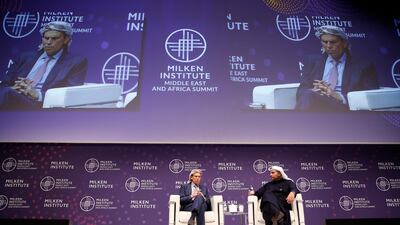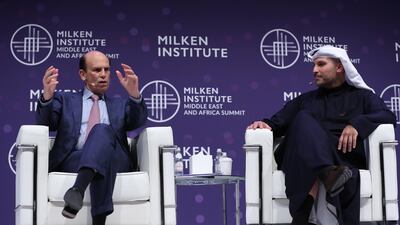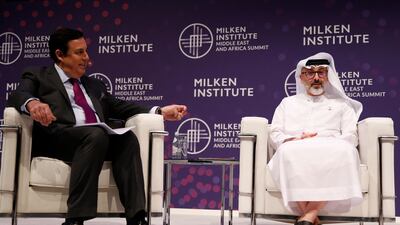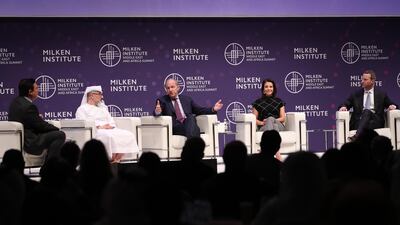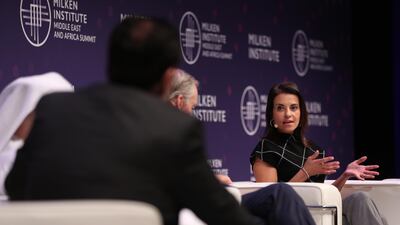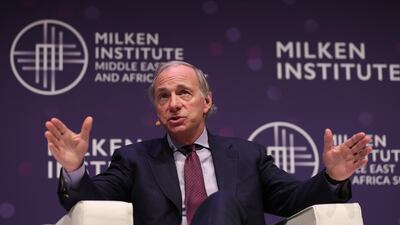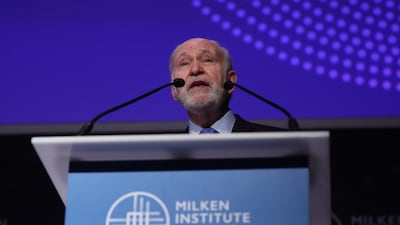Mubadala Investment Company, Abu Dhabi’s strategic investment arm, is looking to “significantly” increase its investments in life sciences and medical technology sector, its group chief executive said.
“It is an amazing space and you will see us ... significantly increase our investments that space,” as the sectors are profitable and serve people at the same time, Khaldoon Khalifa Al Mubarak told delegates at the Milken Institute Middle East and Africa Summit in Abu Dhabi on Tuesday.
“We do that domestically, in terms of how we invest in [healthcare] infrastructure,” Mr Al Mubarak said. “I’m all in when it comes to investing in tech space but double click on med-tech and double click on life sciences, an incredibly exciting area.”
Mubadala is repositioning its portfolio amid a globally tougher economic environment that prompted the International Monetary Fund to revise its global growth outlook.
The company is selling mature assets and pivoting to technology to leverage the momentum brought on by digitisation.
As part of the Mubadala’s domestic expansion, the company’s healthcare investment subsidiary bought Abu Dhabi-based Amana Healthcare last month.
Amana was Mubadala Healthcare’s first investment in a UAE health services company. It will continue to look for the “right acquisition opportunities, both on a regional and international level”, to further bolster its portfolio, Waleed Al Muhairi, Mubadala’s deputy group chief executive, said last month.
Mubadala’s healthcare assets in the UAE include Cleveland Clinic Abu Dhabi, Healthpoint, Imperial College London Diabetes Centre, National Reference Laboratory, Abu Dhabi Telemedicine and Capital Health Screening Centre.
The company, which invests on behalf of the Abu Dhabi government, manages more than Dh880 billion in assets. Its international investments include stakes in General Electric, private equity company Carlyle Group, Austria’s oil and gas entity OMV and petrochemicals manufacturers Borealis and Nova Chemicals.
In terms of the investment outlook for 2020, Mr Al Muhairi on Tuesday said the fundamentals remain stable in the West but the black swan event – the Wuhan coronavirus – will affect the Chinese economy but “nobody knows by how much”.
The spread of the coronavirus has so far claimed more than 1,000 lives and infected more than 40,000 people. Fatalities caused by the virus have surpassed those of Sars in 2002-03. Sars killed 774 people and infected about 8,100 people in 26 countries within eight months, the World Health Organisation figures said.
China’s economy, which decelerated last year on the back of its tariff war with the US, is expected to slide further in 2020. The world’s second-largest economy currently accounts for 17 per cent of global GDP and 13 per cent of global trade. Last week the US Federal Reserve said the coronavirus presents a new risk to the global economy.
“The huge disruptions to production in China’s economy and beyond due to the coronavirus outbreak – through global supply chains into its export markets – will be felt in the weeks ahead,” Sophie Altermatt, an economist with Swiss bank Julius Baer, said in a note to clients on Tuesday. “Not only will a cyclical dent appear in China’s Q1 figures, beyond the one expected from the festive Lunar New Year season, but also in those sectors abroad that are heavily dependent on its production.”
Mr Al Muhairi told the conference Mubadala’s investment strategy is long-term.
“When we invest and when we think about deploying capital, we obviously do not think the short-term six to eight-month cycle. We like investing through the cycle,” he said. “Facts on the ground tell you that right now fundamentals are pretty solid. Certainly, in the West … that’s what the anchor point looks like.”
In terms of emerging market, investors need to exercise caution, as the commodities including aluminium, iron ore and oil will remain depressed on the back of the coronavirus outbreak.
“Now, especially those emerging markets that are heavily dependent on the commodity cycle, especially given the unknown impact of Wuhan is going to be in China, you may see the commodity cycle fizzle a little bit. They [commodities] are going to be relatively depressed for the moment,” he said.
Mr Al Muhairi said that meant that “while I am still bullish on places like Brazil, you need to be a little bit cautious”.
